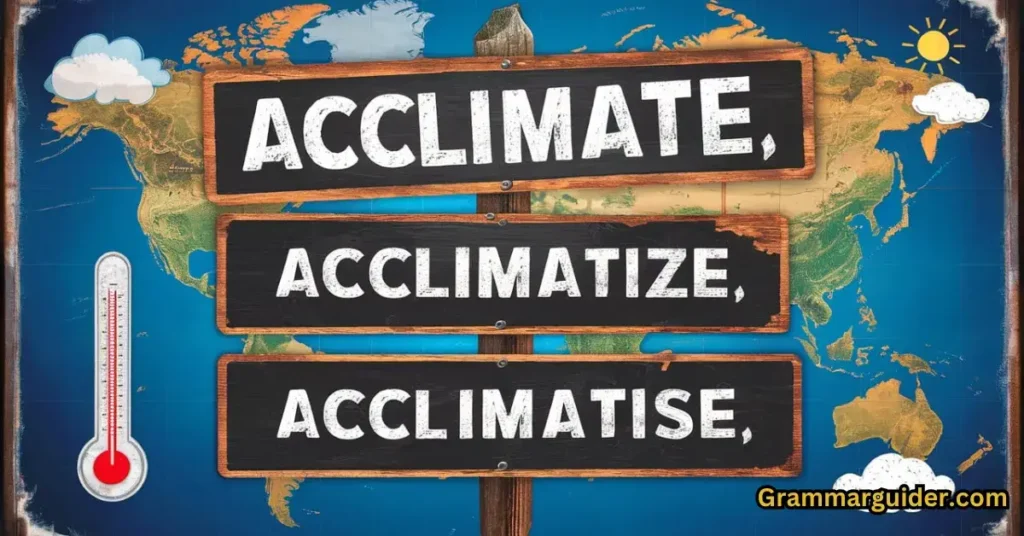When discussing the process of adjusting to new environments, many people are unsure whether to use Acclimate vs Acclimatize, or acclimatise. While these terms refer to becoming accustomed to different conditions, each has its own subtle differences. Understanding when to use each word will ensure you communicate clearly and precisely in both spoken and written forms.
In this article, we’ll explore acclimate vs. acclimatize vs. acclimatise. We’ll also provide examples and scenarios to guide your choice of verb. Whether you’re crafting an email to a colleague or writing a blog post, you’ll feel confident using the correct verb after reading this.
The Difference Between Acclimate and Acclimatize
The terms acclimate and acclimatize are often used interchangeably, but there are subtle differences based on region and context.
Acclimate
Acclimate is predominantly used in American English and refers to the process of adjusting to new conditions, whether social, environmental, or professional. You can use this verb when talking about adapting to new surroundings or situations.
Example (Email):
Subject: Adjusting to Your New Role
Dear Sarah,
I hope you’re doing well! I wanted to check in and see how you’re acclimating to your new position here at the company. Transitions can be tricky, but you’ll adjust quickly.
Don’t hesitate to reach out if you need help. We’re all here for you!
Best regards,
John
In this example, acclimate refers to Sarah’s adjustment to her new job, a common workplace scenario.
Acclimatize
Acclimatize is used more commonly in British English, but it is also accepted in American English. This verb emphasizes the physical process of adjusting to external environmental factors, like weather, temperature, or altitude.
Example (Email):
Subject: Preparing for the Trip
Hi Mark,
I just wanted to remind you that it’s important to give yourself time to acclimatize to the high altitudes when you reach the Alps. Spend a few days at lower elevations first to help your body adjust.
Let me know if you have any questions.
Best,
Emily
Here, acclimatize refers to adjusting physically to the altitude, which requires time for the body to adapt.

What About Acclimatise?
If you’re writing in British English, you may prefer acclimatise, which is simply the British spelling of acclimatize. Despite the difference in spelling, both words carry the same meaning and are used in similar contexts.
Example (Email):
Subject: Getting Ready for the Cold
Hi Lucy,
It looks like you’re headed to a much colder destination next week. Make sure you allow yourself time to acclimatise to the freezing temperatures. It might take a few days to adjust, but layering your clothes and taking regular breaks will help.
Let me know if you need any tips!
Best regards,
Sophie
In this example, acclimatise is used in a British context, referring to adjusting to cold weather.
Acclimatized vs. Acclimated:
Past Tense Forms
Both acclimatized and acclimated describe the past action of adjusting to new conditions. While acclimated is more commonly used in American English, acclimatized is typically preferred in British English. Despite the regional preferences, the meanings remain the same.
Example (Email):
Subject: Adapting to the New System
Dear Alex,
I wanted to congratulate you on how quickly your team has acclimated to the new software system. Transitioning to new tools can be challenging, but you all made it look easy.
Keep up the great work!
Cheers,
Rebecca
Here, acclimated refers to the team’s adjustment to the new software.
Example (Email):
Subject: Adjusting to the New Schedule
Dear Brian,
I know it can be tough adjusting to the new work schedule, but I’m confident that you’ll soon be acclimatized to the routine. Everyone takes a little time to get used to changes like these.
Let me know if there’s anything I can do to help during the adjustment period.
Best,
Samantha
In this example, acclimatized reflects the adjustment to a new schedule, with a slight British touch.

Acclimatization vs. Acclimation:
Which One to Use?
While acclimatization and acclimation both describe the process of adjusting to new conditions, there’s a small difference in how they’re used.
- Acclimatization usually refers to the physical process of adjusting to environmental factors, like temperature or altitude.
- Acclimation can refer to both physical and psychological adjustments, making it a broader term.
Example (Email):
Subject: Preparing for Your Upcoming Trip
Hi Anna,
I wanted to remind you that it’s important to give yourself time for acclimatization before the big hike. When you arrive, try to rest and adjust to the altitude before heading up to the higher elevations. This will help your body adjust and avoid altitude sickness.
Let me know if you need any more tips.
Best,
Liam
In this example, acclimatization is used to emphasize the physical adjustment to altitude.
Example (Email):
Subject: Transitioning to the New Office
Hi Grace,
I understand that adjusting to the new office space can take some time. You’ll likely need to acclimate to the new surroundings, and that’s completely normal. It’s all part of settling into a new environment.
Let me know if you have any questions.
Best regards,
Matt
Here, acclimate refers to adjusting to the new office, which may include both physical and social adjustments.
Quick Comparison: Acclimate vs. Acclimatize
| Term | Preferred Region | Context | Example |
|---|---|---|---|
| Acclimate | American English | General adjustment to any new environment | “It takes time to acclimate to a new city.” |
| Acclimatize | British English (also used in American English) | Adjustment to physical environmental factors (altitude, climate) | “The climbers need a few days to acclimatize to the altitude.” |
| Acclimatise | British English | Same meaning as acclimatize, just the British spelling | “It might take a while for your body to acclimatise to the cold.” |
Conclusion: Choosing the Right Verb
In choosing between acclimate, acclimatize, and acclimatise, consider the region, your audience, and the specific context. If you’re writing in American English, acclimate is often the best choice. In British English, acclimatise is the preferred form. For more formal or technical contexts, especially when discussing physical adjustments, acclimatize is usually appropriate.
Understanding these distinctions will help you communicate more effectively, whether you’re describing a team adjusting to a new software system or someone preparing for a hike in the mountains.

Harley Rose is a seasoned expert in English grammar and writing tips, blending years of knowledge and a love for language into her work. With a sharp eye for detail and a talent for making grammar accessible, Harley shares practical insights that help readers write with precision and flair. Her content is ideal for anyone looking to strengthen their writing skills and express themselves with confidence.

